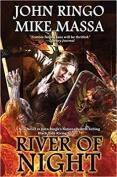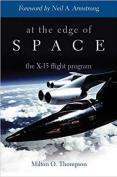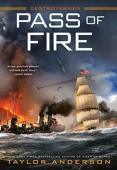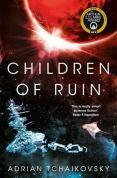Andreas Rosboch's Blog, page 14
August 30, 2019
Atmosphaera Incognita – Neal Stephenson

Real estate agent Emma reconnects with school friend Carl, who is now a billionaire. Carl wants to build a tower twenty kilometres tall, and he drafts Emma into the project.
The sheer scale of the project described is staggering, and the technical challenges are excellently described. Despite the necessity for such detail, Mr. Stephenson manages to steer this novella away from being a technical treatise, focusing on the human and the personal. A delightful tale of hubris and triumph.

August 29, 2019
Monster Hunter Guardian (Monster Hunter International VII) – Larry Correia & Sarah A. Hoyt

While Owen, Earl and most of the rest of the hunters are on their mission on Severny Island, as told in Monster Hunter Siege, Julie Shackleford is taking care of her and Owen’s toddler son Ray. An evil mythical creature known as Brother Death has taken an interest in Ray, since his ancestry on both sides imbues him with powerful magic. Through deception and violence, Brother Death kidnaps Ray, and Julie must set off to retrieve him safely.
The novel is an enjoyable diversion from the main stories of the series. Julie Shackleford certainly deserved a story told from her perspective, giving a rather different perspective to that of Owen, or even Earl, who had his own story in Monster Hunter Alpha. The action is, as usual, fantastic. Fully Mission-Impossible-worthy, extended set pieces dominate the book. On the flip side, Julie is a much more serious character compared to Owen, so the trademark humour is rather toned down. Unfortunately, it has been replaced by an excess of Europe-bashing and stereotyping. It’s all well and good to make fun of other cultures, but the thinly veiled tone of superiority by an American visitor is almost cringeworthy at times.

August 16, 2019
Aurora – Kim Stanley Robinson

Over a hundred and fifty years into their voyage, the inhabitants of a generation starship are only a decade out from the Tau Ceti star system. Despite the massive size of the ship, delicate ecological cycles have been slowly deteriorating over the decades. After arrival, more serious problems crop up with the colonisation effort. The issues are so severe that the colonists are faced with deciding whether to stay, or attempt a return to Earth. Both options are fraught with risk.
While the novel ostensibly chronicles the life of a single inhabitant, Freya, it is also fair to say that the AI running the ship is as much a protagonist. Ship, as it prefers to call itself (or is it themselves) develops over time under the ministrations of Freya’s mother Devi, and much of the novel deals with the emergence of its consciousness. Indeed, many pages are spent debating the nature of consciousness and sentience. Is Ship truly sentient? Can a purportedly sentient being even know if it is sentient?
A lot of time is also spent on the suitability attempting to colonise other star systems, or even other planets in the Solar System. Mr. Robinson’s ultimate answer to this question is rather surprising, but hopeful in its own way.
The narrative feels somewhat impersonal, as if the reader is kept at a distance from the protagonist and even the action. This seems to be a conscious choice on the part of Mr. Robinson, given that the story is told in the voice of Ship itself, even as Ship’s understanding of language and humans develops. An interesting narrative device, and finely implemented.

August 3, 2019
River of Night (Black Tide Rising VII) – John Ringo & Mike Massa

The sequel to The Valley of Shadows follows Tom Smith, Risky, Astroga and the rest after their escape from New York. The plan is to establish a settlement with adequate defenses, and also very importantly electrical power. However, a band calling itself Gleaners, set up by a scruple-deprived man called Harlan Green, has similar plans. And they lack the morals of Tom’s group.
The zombies are still around in this installment, but they act more like nuisance monsters than a major threat. Fittingly, the biggest danger to humans is other humans. There is some fine action as always, with a major set piece battle capping the book.

July 22, 2019
At the Edge of Space: The X-15 Flight Program – Milton O. Thompson

The X-15 program ran from 1959 to 1968, with three aircraft exploring high altitude and high-speed flight. The research program contributed a wide range of scientific advances that were instrumental in the development of the Space Shuttle and fly by wire control technology, among other things. The work of flying the X-15 was dangerous and exacting, leading to the death of one pilot and involving numerous emergencies. It remains to this date by far the fastest and highest-flying winged aircraft in history.
Mr. Thompson’s account is matter-of-fact, with few embellishments. (The author does note that he is not a writer.) While it retains a certain flatness of style throughout, the book is nonetheless fascinating for the aviation buff. These men, including a young Neil Armstrong, were exploring the unknown fringes of the flight envelope in an unforgiving aircraft, frequently referred to in the book as “The Bull”. While sometimes the text veers into catalogues of flights with their respective purposes, it is peppered with interesting and funny anecdotes, as well as edge-of-your-seat accounts of in-flight emergencies.

July 7, 2019
The Lightning Thief (Percy Jackson and the Olympians I) – Rick Riordan

Twelve-year old Perseus “Percy” Jackson goes to a boarding school because of learning difficulties. And odd stuff keeps happening, such as when he accidentally vaporises one of his teachers while on a field trip. As it turns out, Percy is a demi-god, and soon finds himself in all sorts of trouble with the ancient Greek Pantheon.
The story is clever, and the writing snappy. For a young adult reader, the protagonist is readily identifiable. The idea of using Greek Mythology and applying it to the modern day is inspired. I enjoyed the story, but did find myself annoyed at the sometimes excessive pandering to younger readers and their (perceived) tastes.

June 26, 2019
Pass of Fire (Destroyermen XIV) – Taylor Anderson

In the fourteenth installment of Destroyermen, the Grand Alliance has finally pushed the Grik up against the wall. The First Allied Expeditionary Force has a firm foothold along the Zambezi downriver from the Grik capital, whilst the army of the Republic of Real People is pushing north to join up. The final assault on Sofesshk is about to begin. Unfortunately, the Grik are well dug in, and rooting them out will take some innovative tactics. Also, just defeating the Grik on the battlefield will not be sufficient. They must be broken politically in order to prevent a retreat and resurgence.
Meanwhile, on the American front, the Second Allied Expeditionary Force is set to assault the Pass of Fire, and will find out the depths to which the Dominion will sink in their exploitation of the populace. League of Tripoli forces loom in the wings, scheming.
There is even more battlefield action than usual in Pass of Fire. And it is the good stuff. Mr. Anderson continues to show a talent for expanding the story, while still moving it forward and closing off plot threads. There is obviously plenty more to come.
The world of Destroyermen is becoming rather complex, with myriad military actions, references to previous events, and many, many ship types. Thankfully, there is a Wiki with maps, ships drawings, characters bios and more.

June 18, 2019
Flying Upside Down – Duke Nukem

An extremely irreverent book about flying as a contract pilot in Mainland China. Everything from living conditions, to pay, to punitive schemes for minor infractions, to hair-raising transcripts of conversations with air traffic control, management, and first officers. The structure is loose, mainly made up of anecdotes and redacted emails from company officials.
The book is self-published and free to distribute. It is also full of grammatical and orthographic errors, with a structure that barely deserves the moniker. The tone is joking, sarcastic and exasperated, often to excess. The formatting goes from passable to awful. The content, though, is fascinating and horrifying in equal measure. The non-pilot would probably not find it very interesting, as it is full of jargon and addresses the unique aspects challenges of the profession.

June 11, 2019
Children of Ruin (Children of Time II) – Adrian Tchaikovsky

A generation after the conclusion of Children of Time, an exploration ship leaves Kern’s World, arriving some time later, by means of sublight travel and crew hibernation, at a star system that appears to harbour life. Unbeknownst to the mixed Portiid and Human crew, millenia previously a terraforming mission arrived from Earth’s fallen Old Empire. Catastrophe befell that mission, leaving behind a spacefaring race of intelligent, uplifted octopi, as well as an ancient alien virus.
The premise involving uplifted octopi is ambitious, even more so than the premise of uplifted spiders in the first novel. The distributed intelligence of an octopus is very alien to the reader, and Mr. Tchaikovsky makes a concerted effort to convey this. Unfortunately for the story, this makes decision making by the characters frequently confusing, contradictory, and transitory, as this is the nature of the sentience of the depicted octopi. While clever, it takes the reader somewhat out of the story. As in Children of Time, the spectre of deep time weighs heavily on the story, bringing themes of legacy, of connection between intelligences, and of the meaning of existence.

May 29, 2019
Voices of the Fall (Black Tide Rising VI½) – John Ringo & Gary Poole (ed.)

A collection of short stories set in the Black Tide Rising universe. As with the first collection, the quality is mixed, but as a whole the book is entertaining for fans of the series.




